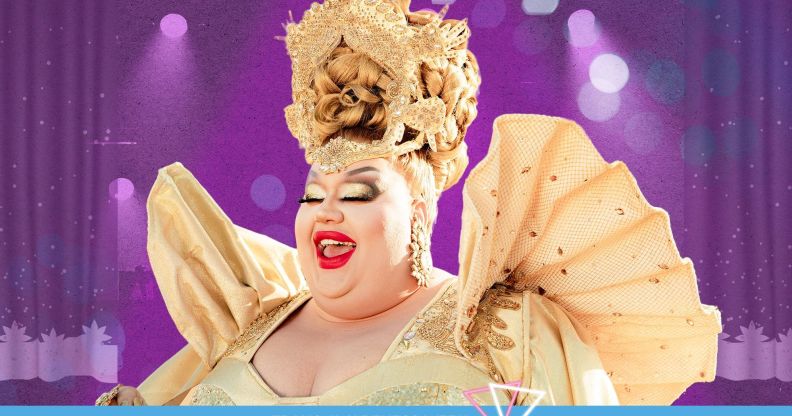Drag Race icon Eureka on sobriety, speaking out and taking on the bigots in We’re Here

Drag Race and We’re Here star Eureka says going to rehab was the “best decision” of their life. (Johnnie Ingram)
Drag Race icon Eureka talks the anti-LGBTQ+ “pushback” they encountered filming We’re Here season three and their journey to sobriety and authenticity.
Eureka returns for the third season of We’re Here, along with fellow Drag Race alums Bob The Drag Queen and Shangela, travelling to small towns across the US, alongside to inspire the local residents, some of whom identify as queer, to take part in a one-night drag show.
During the filming for this season, though, the trio experienced pretty extreme opposition.
“I think in America right now, and maybe even across the globe, we are finding specific pushback towards queer existence,” Eureka says. “We are starting a lot of those conversations this season, and going into places where those conversations are highly relevant.
“Some of those communities really did push back really hard this season. So we had to take extra precautions for security purposes, for personal support, emotional support of our team, ourselves.”
In the trailer for season three of We’re Here, we see one protestor telling Bob The Drag Queen she needs to “repent”. In Utah, a local councilwoman attempted to prevent the queens from hosting a drag show, as it was being filmed near a children’s park.
“They use this fear tactic on their children, which is really sad you know, because honestly I don’t even like kids,” the star jokes. However, Eureka says it wasn’t just the queens who endured abuse.
“This is probably the most even our teams have ever went through. Just trying to walk through situations to get to us, to touch up our makeup, stuff like that, [and] being called ‘queer’ and ‘f****t.'”
The show’s intention is focussed on showcasing queer joy, with the drag shows that happen at the end of each episode emphasising how the LGBTQ+ community exists in every city, in every small town. It’s about creating a “safe space” for the residents, and showing them that “there’s a lot more support in this community than they realised”.
“We’re not trying to showcase how terrible a town is, or how backwards people’s discriminatory behaviour is here,” Eureka says. “What we’re highlighting are queer experiences through this and those problems, and also we’re highlighting the support, and we’re trying to create conversation that hopefully creates progress.”
Am I the villain? Am I the drama?
•
Political society in Florida would like to think so.
•
Season 3 of #WereHere premieres November 25 on @hbomax pic.twitter.com/9Hgkq1eVuj
— Eureka! (they/them/theirs) ?? (@eurekaohara) September 24, 2022
The All Stars season six finalist, who hails from Bristol in Tennessee, knows how challenging it can be growing up in a small town with people who have “derogatory” and “discriminatory” views.
At one point in their life, the parents of Eureka’s childhood best friend continually prank-called them and told them they were going to hell.
“I went through a lot growing up in school,” Eureka says. “I went through bullying and physical harassment. When I lived [as a] trans [woman] from 18 to 23, in Tennessee, I had to rethink my life because I was being sexually assaulted and bullied, harangued and harassed.”
“I went through a lot and it put a lot of fear in me, which I’ve had to work through and luckily, I’ve been able to.”
Earlier this year, Eureka revealed on Twitter that they had checked into a rehabilitation facility to overcome issues with addiction and their mental health.
“I’m going on nine months sober, no alcohol, not a drop. It’s been tough,” they say now.
“I lost my grandmother after losing my mother. I went through a really dark time at the end of last year, especially the holiday season, because I couldn’t see anybody because of COVID. I couldn’t see my grandmother before she passed away. It was just a lot.”
Months on, and Eureka says that deciding to go to rehab and get help was the “best decision” they ever made.

Eureka checked into a rehab facility in early 2022. (Getty/Paul Archuleta)
“One day I woke up and was like, I’m going to destroy myself if I don’t find out what’s wrong with me and why I’m doing this myself,” they said.
The experience, which included a ten-hour, daily therapy programme for 45 days, helped them to process their emotions. Now, they feel able to fully embrace their “authentic self”.
“When you decide to be your authentic self, you stop fighting with yourself. You know, the worst and the hardest battle anyone can face is the battle within one’s own mind. When you are fighting yourself like that, you can destroy yourself very quickly.
“I’m just so proud to be able to present the best version of myself now, you know,” they add. “Eureka is coming back in a whole new way.”
The third season of We’re Here premieres on 25 November on HBO, with new episodes then added to the HBO Max streaming service . Eureka’s latest single “Big Mawma” is streaming now.

